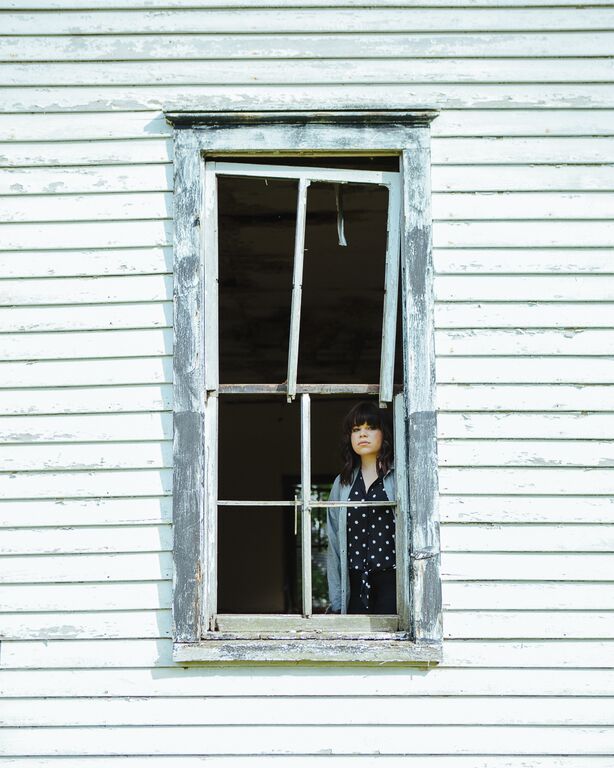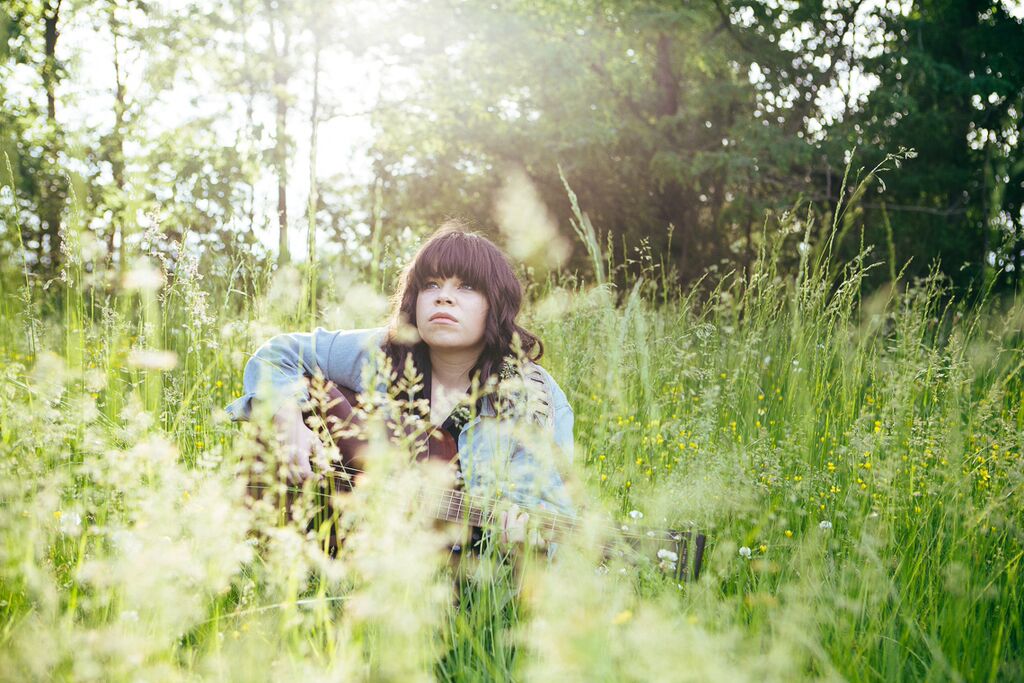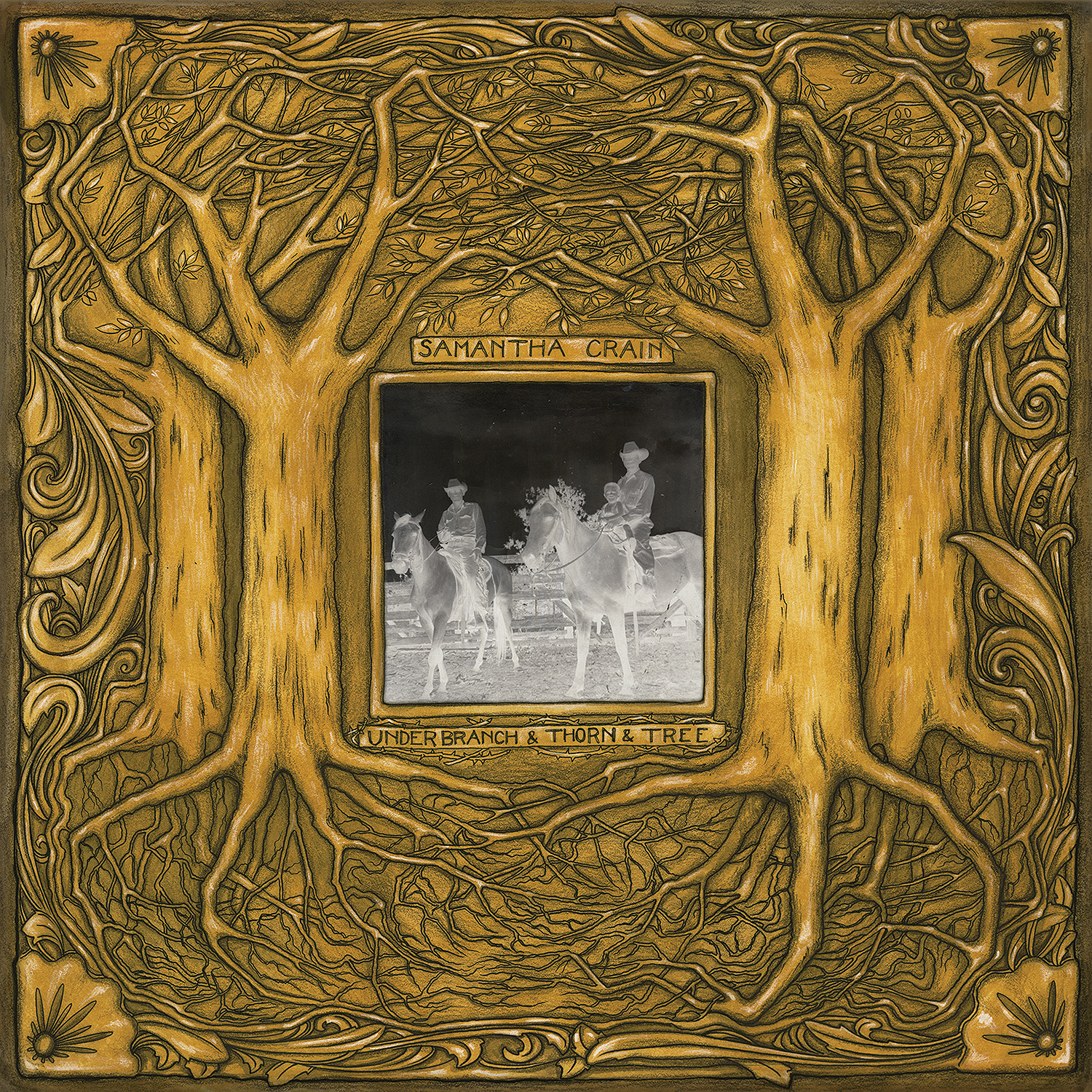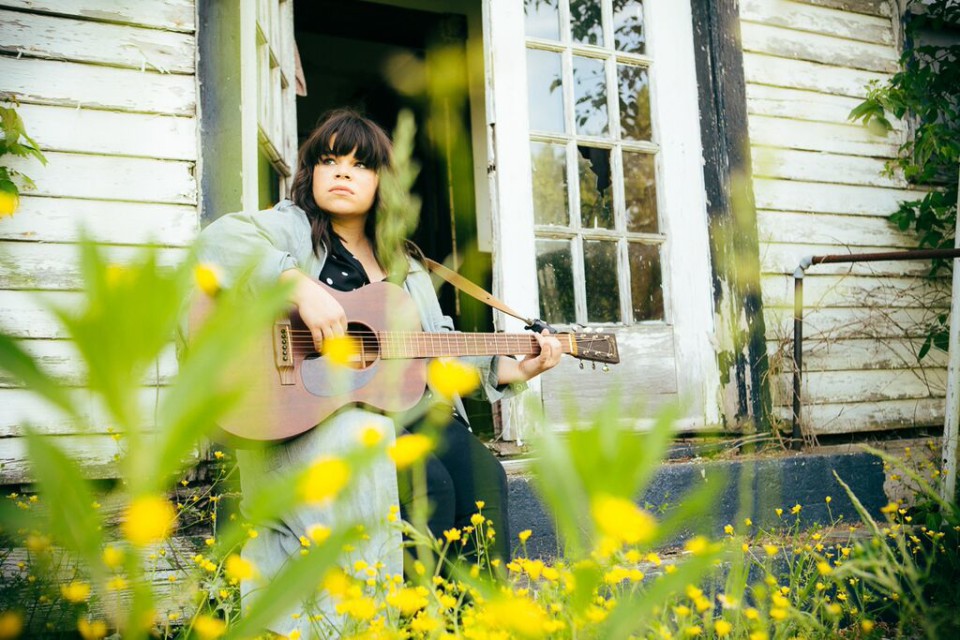As we mentioned a few weeks ago, Oklahoma’s Samantha Crain is set to release her new album this summer. Crain makes folk music in a traditional sense, music by and for the people:
“A kind of communal voice for the people of native cultures being ignored into oblivion by those with influence in modern America… [a celebration of] the people who are under-represented in US entertainment”
We are saving our review for nearer to the July release date but in the mean time we were lucky enough to get a chance to speak with Crain and delve into her writing process and influences.
Jon: I was writing about an album called Grow/Decompose by Young Jesus which seemed to be somewhere between the traditional album and narrative-driven concept album, and it struck me that this seems not only clever and enjoyable but also a very modern way of writing. That is, fragmented and but cohesive on a wider scale. Under Branch & Thorn & Tree (not to mention your previous albums) strikes me as much the same, a collection of songs that are loosely related but without a single clear narrative. Do you feel the same way? Is each song a separate story, so to speak?
Samantha: Each step of the process involved in making an album is very focused for me, in that, it happens in bursts. I usually write most of the songs in a concentrated amount of time, then completely fixate on the arrangements of those songs for a time, then move to recording and production ideas, and then on to the packaging and art and media surrounding the album. So yes, it makes sense that most of my albums including this one have a theme running throughout them because of the manner in which I work on them. I remain largely the same person throughout the process of the album because it moves very quickly. My creativity comes in bursts, as I said. In the case of this one, Under Branch & Thorn & Tree, I was focused on the importance of painting women as multi-dimensional people in a working class, blue collar world. It moves outside of that small focused area at times to include underdogs of all types, any set of marginalized people. After writing “Kid Face”, my last album, I felt I had really dried up my well of personal experiences because that album was so autobiographical. So I needed to look around me for inspiration. But, back to the songs relating to each other, yes, they all do relate to each other because I wrote them with a target in mind. Each song is its own instance though and exists encompassing the bulls-eye.

You told Stereogum that you “don’t write protest songs in the traditional sense, but I’m always listening to the voices of people around me.” I recently read an article by Alynda Segarra (of Hurray For The Riff Raff) where she calls on folk musicians to ‘fall in love with justice’. Do you feel that folk still has the influence and reach to have a positive impact on societal matters?
I definitely think music still has the power to influence politically and socially, it is just a matter of bringing it back into the popular mainstream. I would love to see a time when art does not just imitate life, but art creates the kind of life it imagines. I think this has manifested before in the 60s folk scene, punk in the 70s, a lot of Mento and Reggae, I could go on…. Music has the power to change minds and to nudge humanity down a different path but for the most part I feel like most music just wants to follow the mass around asking what they like and what they want from them. There are bigger things going on, music and art needs to direct attention towards those injustices. Its a good challenge too, to try to do that in a creative way, not just a blatant, literal way.
To return to that Stereogum piece, you said that the songs are written from the perspective of the underdog, “the 99% of us that are working people.” Do you feel that folk (or at least the semi-mainstream line) has been somewhat taken from the working class? Would you lay the blame with the deluge of super-popular middle-class banjo strummers that have flooded the airwaves over the past few years? Or do you think true folk continues independent of popular trends?
The music of the people will exist regardless of what is going is on in the mainstream, there has always been an underground and there will continue to be because zeal and passion will always remain. However, I do think that the music successfully reaching our ears is based on the interests and experiences of a Lilliputian and privileged party. As controversial as the idea may be, coarseness and affliction have been the backdrops for the most moving art, and, yes, the fading recognition of a passionate 99% in favor of a white and heterosexual deep pocket has made music and art quite insipid.
[soundcloud url=”https://api.soundcloud.com/tracks/202035329″ params=”color=ff5500&auto_play=false&hide_related=false&show_comments=true&show_user=true&show_reposts=false” width=”100%” height=”166″ iframe=”true” /]
On the note of folk being taken away from the people, the Segarra piece I mentioned earlier focusses on how folk music is has become something made by and for white heterosexual men, something which I think could be applied to art (or rather: Art, the important capitalised sort) in general. I’ve read a few similar pieces recently: Mitski said she feels she has to be “150 percent and better than everybody in the room to be considered competent,” author Claire Vaye Watkins recently had an epiphany via Twitter where she realised she had been writing to impress white males, and Anwen Crawford wrote about how female music critics aren’t taken seriously. Do you agree that the whole idea of approval/praise in Art is geared towards what men want to consume? Do you feel you have ever put out something which went against your artistic instincts in order to gain patriarchal approval/validation? What needs to change to ensure people have creative freedom in the future?
I do know this is something that happens, artists, especially female artists, feeling they must pander to men in order to be successful, but I’m much too obstinate to let anyone have much influence over what I put out into the world. Not everyone has the same disposition though so the main thing here that we need to work towards imparting is gender and race equality, I’m not talking about legally (although that is a huge first step), I mean really injecting those principles into the framework of society. The more widespread and standard those principles become, the closer we get to a place where artists create freely, and, even more importantly, where people live freely.
I read that you once studied Creative Writing to some extent in college? Do songs blossom from your story writing, or vice versa? Or are they separate endeavours without much crossover?
My “extent” of college lasted just under 2 semesters, so like 8 months. I hated college and I got out of there as soon as I saw another option. Anything I learned about writing, I learned from just reading a lot. I used to write short stories as a kid and into my teenage years but the minute I started writing songs, that all went out the window, I had found the most fitting form of writing for myself. So songwriting is all there is now. I’ve dabbled with the idea of play writing and maybe getting back into short story writing but I’d need to really switch gears to fully focus on and learn that discipline.
Does literature have a big influence on your music? [if so] Who would you say are the writers who have had the biggest impact on your work?
Yes, most of the words that inspire me most weren’t set to music. D.H. Lawrence, Breece D’J Pancake, Dylan Thomas, Edna St. Vincent Millay, Louise Bogan, Flannery O’Connor. I know it’s kind of par for the course of a musician but is it ever a struggle releasing new music? I’ve always wondered how artists feel when complete strangers at their shows know all the words and cherish the songs as something personal to them. Is it difficult to hand over the songs to the listeners after expending so much energy and emotion?
I know it’s kind of par for the course of a musician but is it ever a struggle releasing new music? I’ve always wondered how artists feel when complete strangers at their shows know all the words and cherish the songs as something personal to them. Is it difficult to hand over the songs to the listeners after expending so much energy and emotion?
I don’t find it difficult. For me, by the time the album is coming out, by the time the songs are reaching a public, my energy has already cleared the intensity of the connection with the songs. I can still speak about them and sing them with fervor and dedication because they are mine, but the hypersensitivity has mellowed, a bit like “I can see clearly now the rain is gone”.
Finally, could you share four or five of the acts you are listening to at the moment. They can new or old, popular or obscure, whatever you find yourself returning to.
Favorite music right now: Frazey Ford, Chad VanGaalen, Eef Barzelay, Chopin Nocturnes, and Sibylle Baier.
Samantha Crain’s new album, Under Branch & Thorn & Tree, is out on the 17th July. You can pre-order it now from her official website or Full Time Hobby, and if you sign-up to the mailing list then you can get ‘Outside The Pale’ as a free download right now. The impatient among you should head over to the store and delve into her back-catalogue. Crain is also touring extensively this summer, including some UK dates (see below). A full list can be found here.
31st July : Perth – Southern Fried Roots Festival
1st Aug: Perth – Southern Fried Roots Festival
2nd Aug: Glasgow – Broadcast
3rd Aug: Leeds – Brudenell Social Club
4th Aug: Manchester – Gullivers
5th Aug: Bristol – The Louisiana
6th Aug: London – Sebright Arms
7th Aug: Brighton – Hope and Ruin

